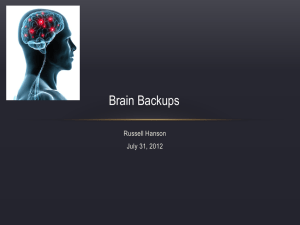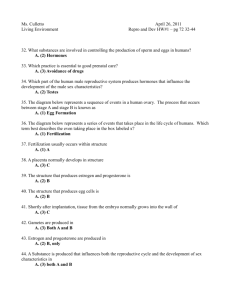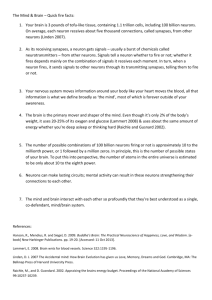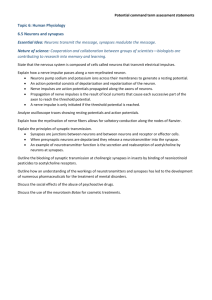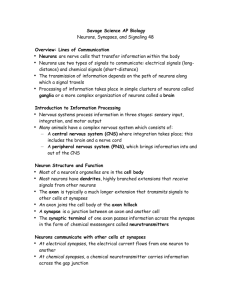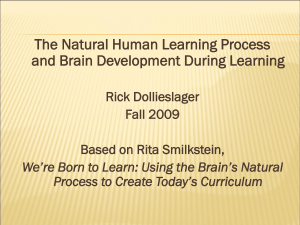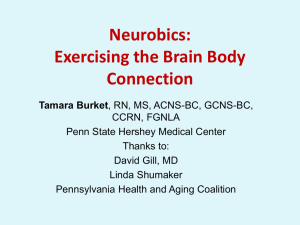Topic 6B Human Physiology
advertisement
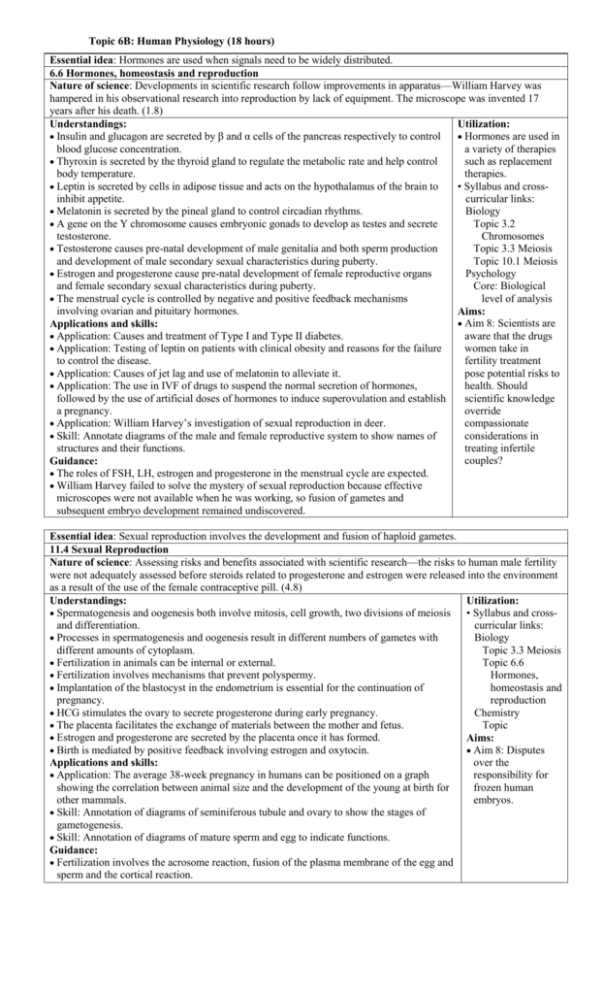
Topic 6B: Human Physiology (18 hours) Essential idea: Hormones are used when signals need to be widely distributed. 6.6 Hormones, homeostasis and reproduction Nature of science: Developments in scientific research follow improvements in apparatus—William Harvey was hampered in his observational research into reproduction by lack of equipment. The microscope was invented 17 years after his death. (1.8) Understandings: Utilization: Insulin and glucagon are secreted by β and α cells of the pancreas respectively to control Hormones are used in blood glucose concentration. a variety of therapies Thyroxin is secreted by the thyroid gland to regulate the metabolic rate and help control such as replacement body temperature. therapies. Leptin is secreted by cells in adipose tissue and acts on the hypothalamus of the brain to • Syllabus and crossinhibit appetite. curricular links: Melatonin is secreted by the pineal gland to control circadian rhythms. Biology A gene on the Y chromosome causes embryonic gonads to develop as testes and secrete Topic 3.2 testosterone. Chromosomes Testosterone causes pre-natal development of male genitalia and both sperm production Topic 3.3 Meiosis and development of male secondary sexual characteristics during puberty. Topic 10.1 Meiosis Estrogen and progesterone cause pre-natal development of female reproductive organs Psychology and female secondary sexual characteristics during puberty. Core: Biological The menstrual cycle is controlled by negative and positive feedback mechanisms level of analysis involving ovarian and pituitary hormones. Aims: Aim 8: Scientists are Applications and skills: Application: Causes and treatment of Type I and Type II diabetes. aware that the drugs Application: Testing of leptin on patients with clinical obesity and reasons for the failure women take in to control the disease. fertility treatment Application: Causes of jet lag and use of melatonin to alleviate it. pose potential risks to Application: The use in IVF of drugs to suspend the normal secretion of hormones, health. Should followed by the use of artificial doses of hormones to induce superovulation and establish scientific knowledge a pregnancy. override Application: William Harvey’s investigation of sexual reproduction in deer. compassionate Skill: Annotate diagrams of the male and female reproductive system to show names of considerations in structures and their functions. treating infertile couples? Guidance: The roles of FSH, LH, estrogen and progesterone in the menstrual cycle are expected. William Harvey failed to solve the mystery of sexual reproduction because effective microscopes were not available when he was working, so fusion of gametes and subsequent embryo development remained undiscovered. Essential idea: Sexual reproduction involves the development and fusion of haploid gametes. 11.4 Sexual Reproduction Nature of science: Assessing risks and benefits associated with scientific research—the risks to human male fertility were not adequately assessed before steroids related to progesterone and estrogen were released into the environment as a result of the use of the female contraceptive pill. (4.8) Understandings: Utilization: Spermatogenesis and oogenesis both involve mitosis, cell growth, two divisions of meiosis • Syllabus and crossand differentiation. curricular links: Processes in spermatogenesis and oogenesis result in different numbers of gametes with Biology different amounts of cytoplasm. Topic 3.3 Meiosis Fertilization in animals can be internal or external. Topic 6.6 Fertilization involves mechanisms that prevent polyspermy. Hormones, Implantation of the blastocyst in the endometrium is essential for the continuation of homeostasis and pregnancy. reproduction HCG stimulates the ovary to secrete progesterone during early pregnancy. Chemistry The placenta facilitates the exchange of materials between the mother and fetus. Topic Estrogen and progesterone are secreted by the placenta once it has formed. Aims: Birth is mediated by positive feedback involving estrogen and oxytocin. Aim 8: Disputes over the Applications and skills: Application: The average 38-week pregnancy in humans can be positioned on a graph responsibility for showing the correlation between animal size and the development of the young at birth for frozen human other mammals. embryos. Skill: Annotation of diagrams of seminiferous tubule and ovary to show the stages of gametogenesis. Skill: Annotation of diagrams of mature sperm and egg to indicate functions. Guidance: Fertilization involves the acrosome reaction, fusion of the plasma membrane of the egg and sperm and the cortical reaction. Topic 6B: Human Physiology (18 hours) Essential idea: Neurons transmit the message, synapses modulate the message. 6.5 Neurons and synapses Nature of science: Cooperation and collaboration between groups of scientists—biologists are contributing to research into memory and learning. (4.3) Understandings: Utilization: Neurons transmit electrical impulses. An understanding of the The myelination of nerve fibres allows for saltatory conduction. workings of neurotransmitters Neurons pump sodium and potassium ions across their membranes to generate and synapses has led to the a resting potential. development of numerous An action potential consists of depolarization and repolarization of the neuron. pharmaceuticals for the treatment Nerve impulses are action potentials propagated along the axons of neurons. of mental disorders. Propagation of nerve impulses is the result of local currents that cause each • Syllabus and cross-curricular successive part of the axon to reach the threshold potential. links: Synapses are junctions between neurons and between neurons and receptor or Biology effector cells. Topic 1.4 Membrane transport When presynaptic neurons are depolarized they release a neurotransmitter into Chemistry the synapse. Topic C6 Electrochemistry, A nerve impulse is only initiated if the threshold potential is reached. rechargeable batteries and fuel cells Applications and skills: Application: Secretion and reabsorption of acetylcholine by neurons at Psychology synapses. Core: Biological level of Application: Blocking of synaptic transmission at cholinergic synapses in analysis insects by binding of neonicotinoid pesticides to acetylcholine receptors. Aims: Skill: Analysis of oscilloscope traces showing resting potentials and action Aim 8: The social effects of the potentials. abuse of psychoactive drugs could be considered, as could the Guidance: The details of structure of different types of neuron are not needed. use of the neurotoxin Botox for Only chemical synapses are required, not electrical, and they can simply be cosmetic treatments. referred to as synapses. Essential idea: The roles of the musculoskeletal system are movement, support and protection. 11.2 Movements Nature of science: Developments in scientific research follow improvements in apparatus—fluorescent calcium ions have been used to study the cyclic interactions in muscle contraction. (1.8) Understandings: Aims: Bones and exoskeletons provide anchorage for muscles and act as levers. Aim 7: Use of grip strength Synovial joints allow certain movements but not others. data loggers to assess muscle Movement of the body requires muscles to work in antagonistic pairs. fatigue. Skeletal muscle fibres are multinucleate and contain specialized endoplasmic Aim 7: Use of animations to reticulum. visualize contraction. Muscle fibres contain many myofibrils. Each myofibril is made up of contractile sarcomeres. The contraction of the skeletal muscle is achieved by the sliding of actin and myosin filaments. ATP hydrolysis and cross bridge formation are necessary for the filaments to slide. Calcium ions and the proteins tropomyosin and troponin control muscle contractions. Applications and skills: Application: Antagonistic pairs of muscles in an insect leg. Skill: Annotation of a diagram of the human elbow. Skill: Drawing labelled diagrams of the structure of a sarcomere. Skill: Analysis of electron micrographs to find the state of contraction of muscle fibres. Guidance: Elbow diagram should include cartilage, synovial fluid, joint capsule, named bones and named antagonistic muscles. Drawing labelled diagrams of the structure of a sarcomere should include Z lines, actin filaments, myosin filaments with heads, and the resultant light and dark bands. Measurement of the length of sarcomeres will require calibration of the eyepiece scale of the microscope. Topic 6B: Human Physiology (18 hours) Essential idea: All animals excrete nitrogenous waste products and some animals also balance water and solute concentrations. 11.3 The kidney and osmoregulation Nature of science: Curiosity about particular phenomena—investigations were carried out to determine how desert animals prevent water loss in their wastes. (1.5) Understandings: Utilization: Animals are either osmoregulators or The removal of kidney stones by ultra sound treatment. osmoconformers. • Syllabus and cross-curricular links: The Malpighian tubule system in insects and the Biology kidney carry out osmoregulation and removal of Topic 1.3 Membrane structure nitrogenous wastes. Topic 1.4 Membrane transport The composition of blood in the renal artery is different from that in the renal vein. The ultrastructure of the glomerulus and Bowman’s capsule facilitate ultrafiltration. The proximal convoluted tubule selectively reabsorbs useful substances by active transport. The loop of Henle maintains hypertonic conditions in the medulla. ADH controls reabsorption of water in the collecting duct. The length of the loop of Henle is positively correlated with the need for water conservation in animals. The type of nitrogenous waste in animals is correlated with evolutionary history and habitat. Applications and skills: Application: Consequences of dehydration and overhydration. Application: Treatment of kidney failure by hemodialysis or kidney transplant. Application: Blood cells, glucose, proteins and drugs are detected in urinary tests. Skill: Drawing and labelling a diagram of the human kidney. Skill: Annotation of diagrams of the nephron. Guidance: ADH will be used in preference to vasopressin. The diagram of the nephron should include glomerulus, Bowman’s capsule, proximal convoluted tubule, loop of Henle, distal convoluted tubule; the relationship between the nephron and the collecting duct should be included.
